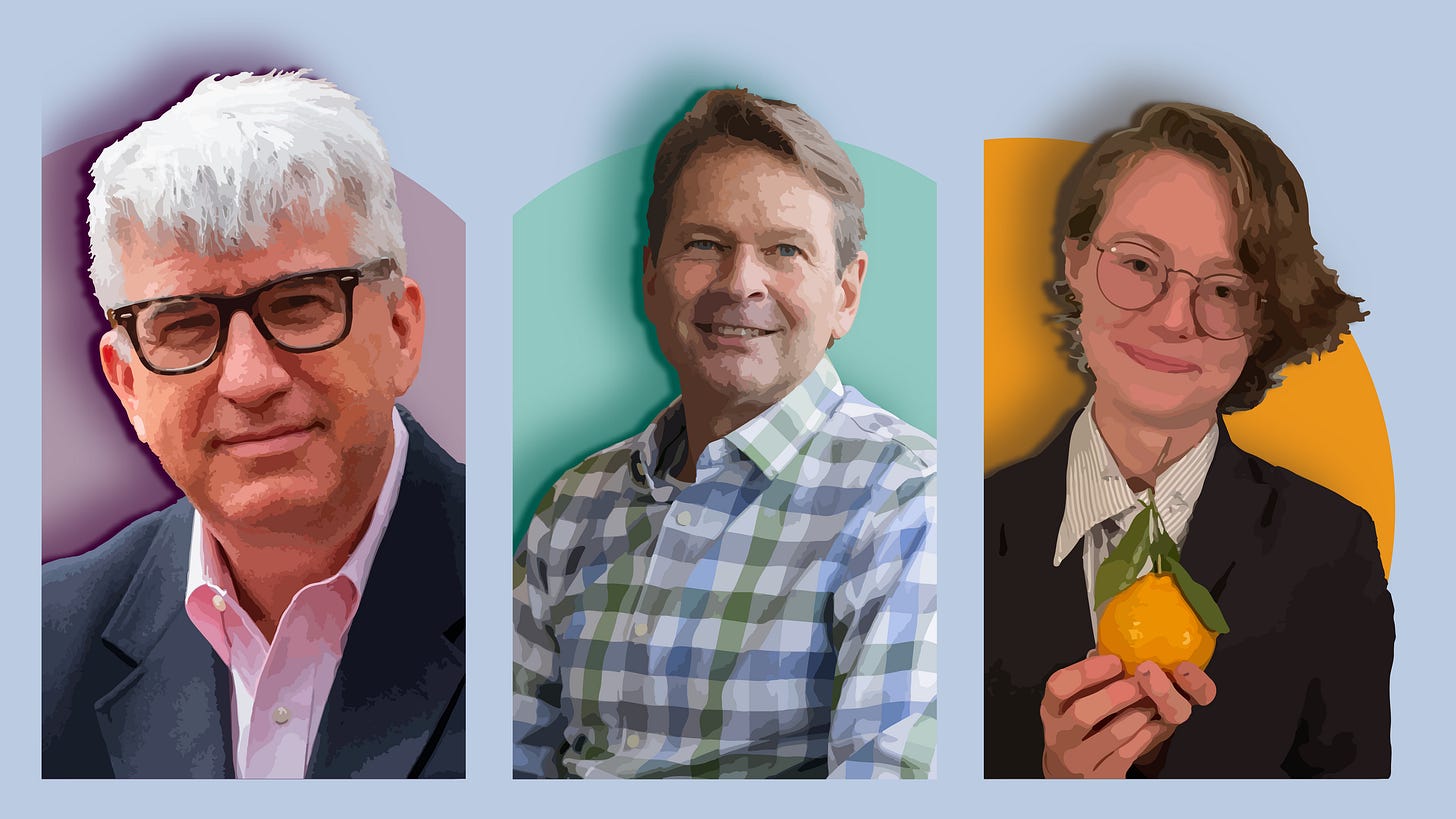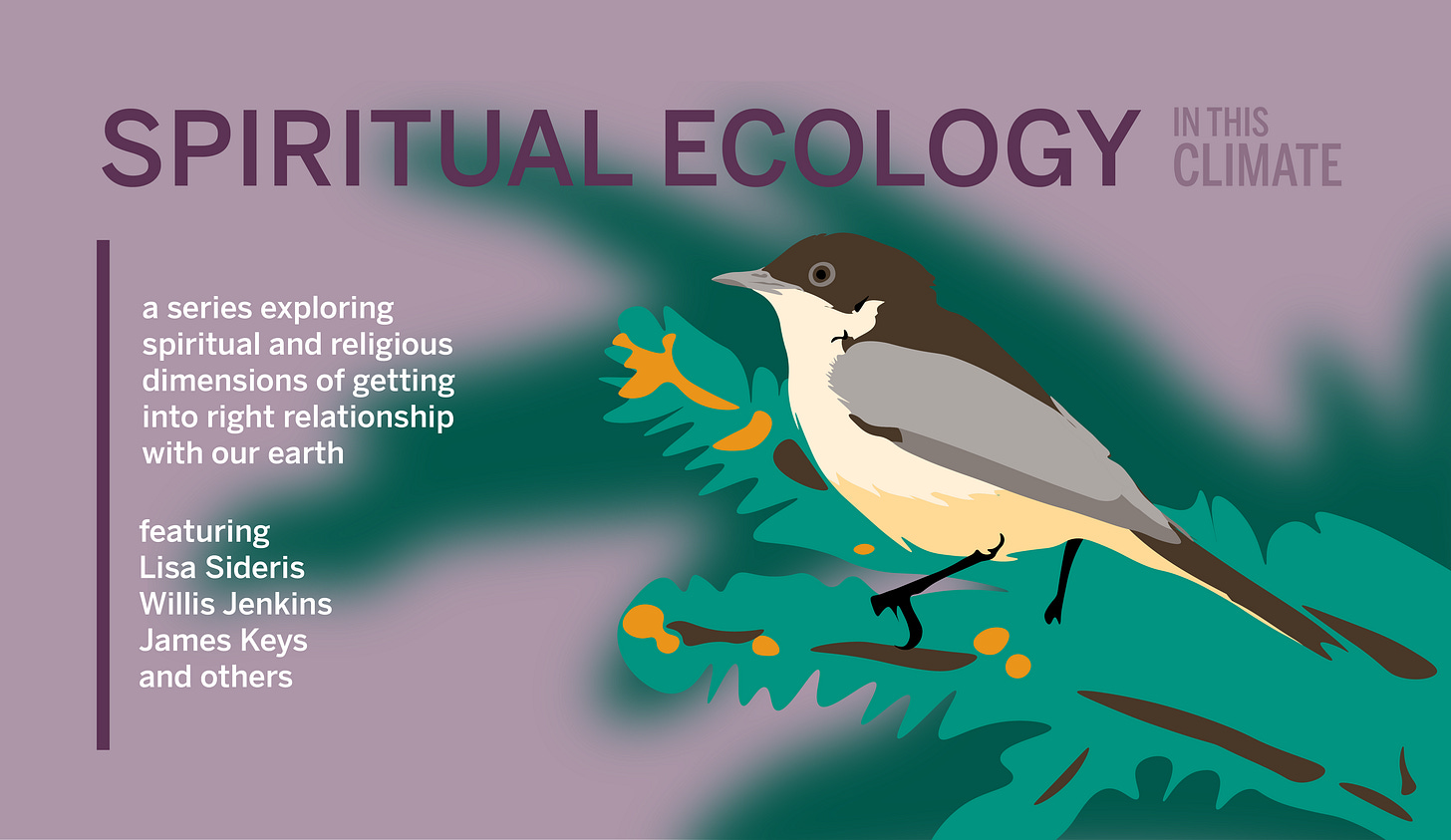Welcome! You are one of the very first people to read In This Climate’s monthly newsletter, and we are so grateful to you. This first edition will not be short, since we have some catching-up to do. And it will not be the sprawling essay web that it may in future days be! Rather, it will be much like a list. Hope that’s fine for now.
Did this email get forwarded to you? Want more to appear in your inbox? You can sign up for that.
What is this? Who are we?
Quickly, this is a podcast’s newsletter. It’s written mostly by Emily, the producer, and features hosts Gabe Filippelli and Jim Shanahan. Maybe it’ll feature other people, too! We’re all about flexibility and fluidity here.
In This Climate, the podcast itself, comes from the Environmental Resilience Institute and The Media School. It outlines a sustainable and resilient path forward through analysis of scientific data, conversation, and storytelling. ITC works to imagine and inspire an environmentally just future by amplifying the voices of those most affected by environmental burdens and climate change and those historically marginalized within the environmental movement.
We’ll put it all in context, strip out the jargon and doom-and-gloom fatalism, and make environmental news something you can use. Hopefully.
Neither fork nor crossroads
Since the summer of 2019, we’ve posted the sounds of everything from more sustainable beer brewing in the Midwest to campesino land defense in Panama. We’ve featured the audible scurrying of Maverick the black vulture and danced with the topic of love on every possible occasion. We’re trying to climb that ladder of abstraction, tying details to what they reveal. And what do we want to happen?
At the top of the ladder, we’re looking for changes in relationships — deeper connection — with fellow humans, animals, plants, and the earth in all forms. At the bottom, increasingly, it depends. This variability is not a fork in the road, not a crossroads, not something that fits well inside linear metaphor. It could, however, be an opportunity to explore.
Noted explorer James Keys, whom you’ll hear in the podcast soon enough, recently sent me a passage from a book he’s reading:
Instead of telling people what to do or what to believe, he invited them to see things differently, confident that if they did so, their behavior would change accordingly. This called for working with peoples’ imaginations more than their reason or their will. If listeners were to accept his invitation, the place to which they were being invited would have to seem real to them. So, because the reality his hearers were most familiar with consisted of concrete particulars, Jesus began with those particulars.
Author Huston Smith goes on to reference mustard seeds and other bits of New Testament daily life. James knew this would resonate, because isn’t that the great challenge of mass messaging on environmental issues? Our realities, our inspiration-arousing details, feel so far apart. Only some of us enjoy intimate familiarity with mustard seeds, or any seeds at all — here’s to movements for restoring seed sovereignty. Only some of us have meaningful access to formal political processes and the requisite capital to find relevance in the federal reserve system. With all this separation, what can happen at the bottom of the ladder on a Hoosier-produced podcast such that we see more expansively, relate more fully, and respond more lovingly to ecosystems in distress?
If we were talking about narratives — and we always are — this is our engine. This is the unanswered question and impossible pursuit that keeps us reaching to communicate with greater care.
In his book chapter, “Social Causality of our Common Climate Crisis: Toward a Sociodicy for the Anthropocene,” Jesse Ribot discusses the messaging of yet another religious teacher:
He argues that social mutuality is needed to guard and sustain humans and to sustain our common home. The world is part of our common heritage and our future, and the world’s wellbeing (that is, environmental sustainability) depends on a necessary social interdependence. In this sense, the Pope is channeling Judith Butler (2009), who talks about security and precarity and the fundamental social interdependence of people at all stages of life.
Let’s meditate on the perception of material separation in the context of socio-ecological inextricability. If this were a podcast, and not a podcast’s newsletter, I’d leave some silence here.
In the next section, you’ll find a sampler of the details and corresponding systems we’ve been thinking about this season. Some of the recordings happened a little while ago, and as it turns out, they’re all still relevant.
Season Three so far
Emergent Strategy with adrienne maree brown
amb is a writer, facilitator, emergent strategist, and so much more. Beginning with a reflection on the places (so-called Bloomington and Detroit) where we live, we swim through understandings of community, love, energy transition, and how we can begin to live toward right relationship with all else that is.
Navigating gas leasing with Stephanie Malin
Back in December 2020, we talked with environmental sociologist Stephanie Malin about the ins and outs of natural gas leasing. Like, how is it that a company obtains rights to drill in the middle of farmland? How do farmers feel about that? And as always, how does money flow and motivate and determine access to political processes?
Investing in local growing with Cedar Valley Permaculture
Many of us here in Indiana wonder how we can access local food as the weather gets colder and warm-weather plants go dormant. So, in three parts, we're asking folks near Bloomington how they prepare for and operate in winter.
In this episode, we join Stewart Hamilton and Kelsey Campbell for a Friday harvest and chat through lettuce bagging. They talk about the value of local, sustainably grown food and what needs to change in order to build capacity for local growing and eating in future winters.
Touring Brambleberry Permaculture Farm
If you haven't yet listened to our discussion with Darren Bender-Beauregard, we recommend you do that here! It provides context for Darren’s relationship with the land, how he grows Andean crops in Indiana, the sorts of grants that help his family experiment and educate, and more.
Then, listen to this tour for concrete insights into how Darren and his family channel and encourage ecological abundance.
The Buffalo Springs Restoration Project in the Hoosier National Forest
A discussion about a proposed forest restoration project in the Hoosier NF, including insights from Ranger Chris Thornton (HNF), Kyle Brazil (Central Hardwood Joint Venture), and Steven Stewart (Save Hoosier National Forest).
Reimagining Transportation: how we got here
In this episode of our series (to be continued in the future) on reimagining transportation, urban history expert John Fairfield helps us understand how our transportation infrastructure developed and what we can do to modify it in a sustainable direction.
Nobody wants a good rain
In a splendid blend of art and science, Monika Mondal pulls together sound, perspectives, and quantitative data to explain how changing monsoon patterns and economic pressures are shaping agriculture in Muzaffarnagar, known for its sugar farms and mills in the sugar bowl of India, Uttar Pradesh.
Thanks to grant funding from the Environmental Resilience Institute, ITC is able to pay those working toward environmental justice to tell your own stories, with as much or as little production help as you'd like. Want to pitch or learn more? Email Emily at itcpod@indiana.edu or find our DMs @thisclimatepod on Twitter and Instagram.
Addressing intensifying storms with Marshall Shepherd
In this conversation with researcher, meteorologist, and science communicator Marshall Shepherd, we cover a lot of ground, connecting inequities in academia to environmental injustices associated with infrastructure and intensifying storms.
Maintaining agile and flexible infrastructure with Mikhail Chester
In this episode, we dive deep into the history of infrastructure to uncover elements of both hardware and knowledge systems that hold us back from resilience to climate change.
Guest Mikhail Chester provides theoretical insight and lots of tangible examples of people who are figuring out how to improve infrastructure for a world of decreasing stability.
Next Up
Amid the prolonged tumult of everything, we are tired. So we turn again to the relationship between spirituality and ecology, in search of connection and healing.
For background, we went live on Facebook with Mitch Hescox the morning of December 2, 2020 to kick off a series of episodes diving into the themes of stewardship, interrelation, and the sacred. We continued in conversation with Deborah McGregor and Sandy Sasso. Now, we’re picking back up with some recordings fresh and aged! I’ve enjoyed editing them, and I think you’ll enjoy listening.
If this intrigues or resonates with you, please let us know! We would love to hear your thoughts and questions. Leave a comment here, email us, send us a voice recording, whatever works for you!
Finally, a quick note of gratitude:
Thank you again for reading our first newsletter. In the future, we’ll offer more episode breakdown and reflection, less introduction and list. If that sounds good to you, you can go ahead and subscribe for free (unsubscribing is super easy).
While you’re waiting on that next edition, here are some ways you can stay engaged with us and maybe even help new listeners find us.
Leave a review on Apple Podcasts or wherever you listen
Follow us (maybe talk about us?) on Facebook, Instagram, and Twitter
Check out our Youtube channel
Send us emails about your eco-anxiety, ideas for improving environmental justice, what you wish the show would do better, etc.
And feel free to text or call me with all your questions, comments, and tips at 812-202-2051
Until next time!
Emily


